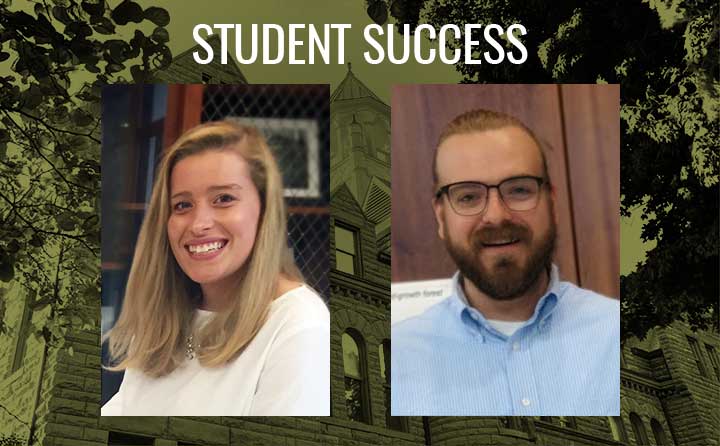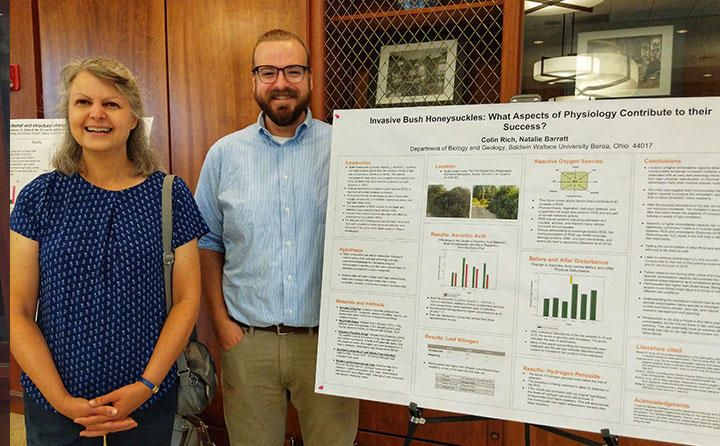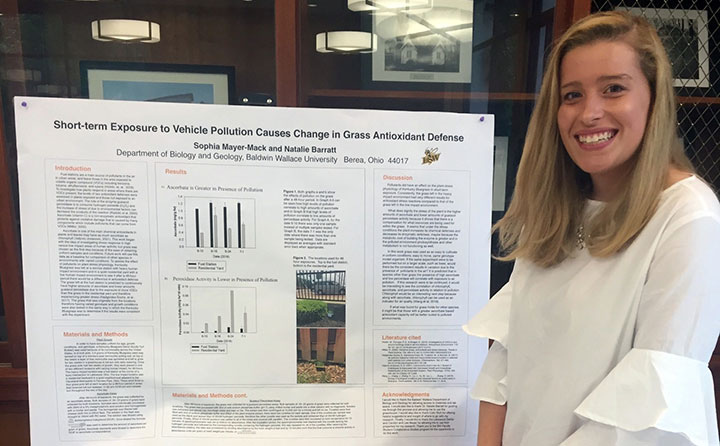 While
many
students
used
the
summer
months
for
some
well-deserved
rest
and
relaxation
from
the
rigors
of
the
academic
year,
biology
majors
Colin
Rich
'19
and
Sophia
Mayer-Mack
'21
spent
the
time
focusing
on
plant
ecophysiology.
While
many
students
used
the
summer
months
for
some
well-deserved
rest
and
relaxation
from
the
rigors
of
the
academic
year,
biology
majors
Colin
Rich
'19
and
Sophia
Mayer-Mack
'21
spent
the
time
focusing
on
plant
ecophysiology.
As participants in BW's new summer STEM faculty-student collaborative scholarship program, Rich and Mayer-Mack fully immersed themselves in research experiences outside the academic year and presented their findings at the Cleveland Botanical Garden Holden Forests and Gardens S.E.A.R.C.H. Undergraduate Research Symposium in August.
 Rich's
project
was
designed
to
compare
the
invasive
bush
honeysuckle
to
a
native
competitor's
capacity
to
tolerate
environmental
stresses.
He
measured
antioxidant
levels
in
the
leaves
of
both
species
with
the
hope
that
his
findings
will
contribute
to
an
understanding
of
the
ways
invasive
plants
might
outcompete
native
species.
Rich's
project
was
designed
to
compare
the
invasive
bush
honeysuckle
to
a
native
competitor's
capacity
to
tolerate
environmental
stresses.
He
measured
antioxidant
levels
in
the
leaves
of
both
species
with
the
hope
that
his
findings
will
contribute
to
an
understanding
of
the
ways
invasive
plants
might
outcompete
native
species.
Rich cites the opportunity to apply his classroom learning to an independent project as integral to his decision to pursue a career in environmental or ecological management or conservation.
Working with Dr. Natalie Barratt, who serves both as Rich's academic advisor and his supervisor in the greenhouse and botany lab, has been rewarding. Rich enjoys the challenge of searching out the answers to questions and problems with Barratt's expert guidance and advice.
"The best thing about BW is the people, both faculty and students," Rich shared. "The faculty get to know you and have a genuine interest in helping you succeed."
 Mayer-Mack's
research
focused
on
plant
stress
physiology
to
demonstrate
human
impact
on
the
environment.
As
fuel
stations
are
the
leading
contributor
to
air
pollution
in
urban
locations,
she
targeted
her
work
in
this
area.
Mayer-Mack's
research
focused
on
plant
stress
physiology
to
demonstrate
human
impact
on
the
environment.
As
fuel
stations
are
the
leading
contributor
to
air
pollution
in
urban
locations,
she
targeted
her
work
in
this
area.
She conducted two tests to measure antioxidant levels in plants to determine the stress they were experiencing. The goal of her research is to highlight the need for sustainable resources to lessen the negative environmental impact of many of our everyday activities.
Mayer-Mack stated that the summer STEM faculty-student collaborative experience allowed her to pursue her own interests and be challenged outside of the classroom. The research she engaged in enabled her to take the initial steps on her intended career in evolutionary biology.
"I love the small class sizes at Baldwin Wallace," Mayer-Mack said. "At a larger school, I may have never had the opportunity to conduct research as a first-year student. The fact that I was able to present at the Cleveland Botanical Gardens Symposium was something else I didn't imagine I'd have been able to do as a sophomore. The experience allowed me to begin planning future research I know will be beneficial to my career goals."